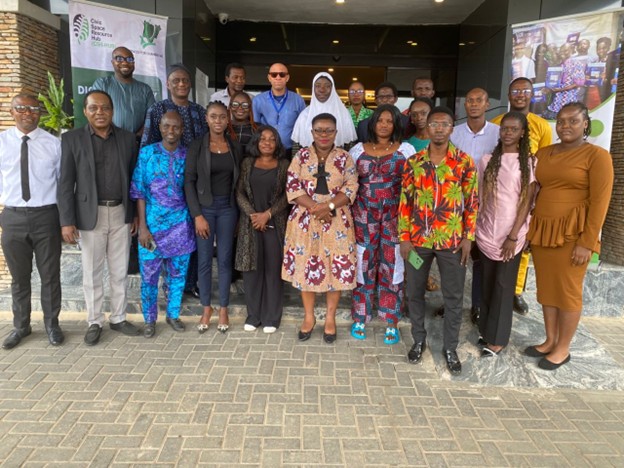Sixty–five participants participated in SPACES FOR CHANGE’s | S4C’s April 11, 2019 workshop aimed at building the capacity of urban policy makers and city planners to enhance the effectiveness of market redevelopment approaches in Imo State, through the adoption of best practices, coherent policies, rule of law and inclusive governance processes. The tensions resulting from the implementation of market redevelopment initiatives in different parts of the state call for very different organizational structures and new relationships between different state departments, social organizations and stakeholders that have a role in urban development.
Participants at the workshop, held in Owerri, Imo State, comprised senior civil servants in Imo State such as permanent secretaries, directors and assistant directors from Imo State ministries of Informal Sector & Market Development, Trade and Investment, Housing, Works, Economic Planning and Budget, Land and Urban Planning, Office of the Surveyor General of Imo State, Public Utilities, and Owerri Capital Development Authority (OCDA). Others include executives of civil society organizations and major market associations in the State, Imo State branch chairmen of the Nigerian Society of Engineers, Nigerian Institution of Surveyors and the Nigerian Institute of Town Planners.
Distinguished scholars and urban experts delivered papers that provided deep insights into the mechanics of designing inclusive market redevelopment initiatives up to delivery to target groups. The first paper, Market Development- Definitions, Best Practices and Preparations by Dr. Victor Onyebueke of the Department of Urban Planning at University of Nigeria, Nsukka, expatiated on the concept of markets and the underlying social and cultural significance to communal development. Markets are symbols of identity, religion, unity, social and economic exchange. Market structures are also hierarchical, beginning with the main market, mini market, retail market and supermarkets. These hierarchies, often linked to certain ancestral deities, are intrinsically linked to the prevailing social norms, values and cultural traditions in the area. Governments need to reckon with these hierarchies in either determining the types of market to build in any locality or when considering remodeling options for an old one. Also, these hierarchies should not be distorted under the guise of market redevelopment mainly because of the cultural and religious underpinnings.
Between 2015–2019, tales of woes by affected traders who lost their shops, goods and livelihood sources at various markets demolished in the state dominated news headlines. Market redevelopment projects were initiated in urban and rural communities across the state without recourse to policy safeguards, mitigation measures, including environmental impact assessment and feasibility studies. Doing these were necessary to avoid costly mistakes by ascertaining in advance, the quantum of human and capital losses that may result and make adequate compensation or relocation arrangements for affected groups. Speculations were rife that state authorities used the pretext of public interest and market redevelopment to unlawfully annex and dispossess citizens of their properties, in clear violation of the Nigerian Land use Act. A change of approach is needed.
The next paper, Enabling Policy Environment for Inclusive Market Development by Dr. Sam Amadi, an urban policy expert, former Chair of the National Electricity Regulatory Commission (NERC), elucidated how the state can effect change its approach in a meaningful and sustainable way. To begin with, lack of policy is the major trigger for the irregularities witnessed in Imo State government’s market redevelopment interventions. A situation where an executive unilaterally develops and implements ideas from his head without subjecting such idea to active legislative scrutiny and stakeholders’ contribution leaves much to be desired. Policies must be seen to be a deliberate system of principles to guide decisions and achieve rational outcomes.
Again, lack of attention to localized knowledge is another trigger for discontent. For example, in the Unites States of America, stakeholders from diverse disciplines are invited to make inputs when foreign policies are crafted while in Nigeria, only the first class brains from reputed universities in the world, including the Nigerian Intelligence Agency, State Security Services and top civil servants in the foreign ministry are the ones invited to make contributions, instead of the general public. This approach fuels exclusion in the development of foreign policy. Government programs often hit brick walls where there is no engagement between the government and the people. Public policy should involve all and should not be secretive. It is also important to emphasize that governance is a process and not an event. Governance is the use of power shared in an interactive process. Technology has changed the landscape of governance, and as such, both governments and citizens need to leverage on technology to increase the quality of civic engagement in governance.
The third paper, Making Public Private Partnerships (PPPs) Work – Frameworks, Partnerships and Value Chains by Dr. George Nwangwu, enlightened participants on the viable ways through which PPPs can be employed to solve the barrage of problems affecting market redevelopment in Imo state. PPPs bring together the best of P in the public, the best of P in private and the P in the partnership, and then calibrate all efforts together to produce an effective result. In this case, the relationship between the public and the private sector is based on a partnership which means that risk is shared between both partners. It follows that engagement during PPP is a necessary factor in order for it to succeed. The people need to be consulted and their interest confirmed before a PPP is put in place.
There are about four forms of PPPs. They include: build, operate, transfer (BOT); build operate own (BOO); build lease transfer (BLT) and design, build, finance and operate (DBFO). PPPs work where there is an enabling legislation that regulates its conduct. Imo current lacks an enabling legislation that guides both the market redevelopment and the urban renewal program in the state. Proper feasibility studies need to be carried out before a project is scheduled for execution using the instrumentality of PPP. Not all projects should be handled through PPP. Some works are better executed using the traditional procurement process and they succeed. And so government should not hide under the guise of PPP to drive project implementation that ordinarily requires traditional execution. The necessity of environmental impact assessment and detailed design need not be overemphasized.
Stakeholder engagement process was identified as a fundamental process the government needs to reckon with before embarking on a PPP project. PPPs cannot work with weak institutional frameworks and systems. Thus, there’s need to strengthen institutions in order to reap the gains of PPP. To institute effective checks and balances in PPP projects, advertisement and bidding for projects are imperative. The Governor should not be in the evaluation committee. Where the committee is transparent, and follows the rules, projects are likely to be delivered successfully and on time.
Ms Olufunke Baruwa’s fourth paper on Promoting Entrepreneurism, Sustaining Creativity and Gender Equity in Market Renewal Projects, shifted the conversation from the markets to the traders and entrepreneurs doing business in the trading centers. An entrepreneur is one who will rather than work as an employee founds and runs a small business assuming all the risks and rewards of the venture. Entrepreneurs holds the keys in alleviating poverty and driving the economy. For an entrepreneur to succeed, the person must be an innovator and a creative thinker. The question now is how we sustain creativity. Doing this involves adding value and doing something different in other to get a positive result. In light of the above, any market redevelopment intervention that does not consider the survival of an entrepreneur is doing more harm than good.
What factors hinder entrepreneurism? Although the people of the South East are famed for their astute business acumen, gender barriers can hinder entrepreneurism. Implementing agencies need to be aware of gender equity in discharging their functions to the public. In developing local and urban markets, deliberate steps need to be taken to entrench gender equality. Gender equity was defined as equal opportunity given to all to excel and grow without any barrier on the basis of sex or gender. Gender equality does not mean that women and men have to become the same, but that their rights, responsibilities and opportunities will not depend on whether they were born male or female. Equity ensures that everybody’s interest is considered and this factor should be paramount in market redevelopment programs of the state. Small business holders, often run by women, should not be muscled out of business in the name of market redevelopment or urban renewal. A gender policy is also lacking in the state, and the time has come to do things differently.
Following a robust debate and group discussions that ensued after the presentations, it was clear the policy gaps and implementation difficulties identified stemmed from minimal levels of observance of the rule of law in the state. In his paper, Promoting Human Rights through Economic Development. Human Rights, Mr Uche Nwakaeti, former Chair of the Nigeria Bar Association, Imo State Chapter, explained the inalienable rights of every individual, protected by law, which cannot be derogated from nor can anyone be deprived of these rights arbitrarily. It follows that these rights remain enjoyable so long as they do not override public interest.
On the other hand, economic development is the process by which a nation improves the economic, political and social well-being of its people. Accordingly, urban renewal and market redevelopment programs must be fashioned in a manner that respects the rights of the people. Respect for human rights entails serving eviction notices where demolitions become necessary and the payment of compensations to affected traders. If the government cannot boldly answer these questions in the affirmative then, they need to re-examine their conduct once again.
Effective market development can only be possible and work when there is conformity with the rule of law, due process and respect for human rights. Rule of law envisages equity before the law, respect to the dictates of the law and obedience of the law. The issue of delayed payment of compensation should be discouraged. Nigeria’s 1999 Constitution provides a legal safeguard for property owners by requiring the payment of compensation for expropriation of property. It then follows that the payment of constitution should not be jettisoned under the guise of exercising governor’s powers pursuant to the Land Use Act. The Owerri Masterplan of 1976 also needs to be reviewed in light of current urban realities.




